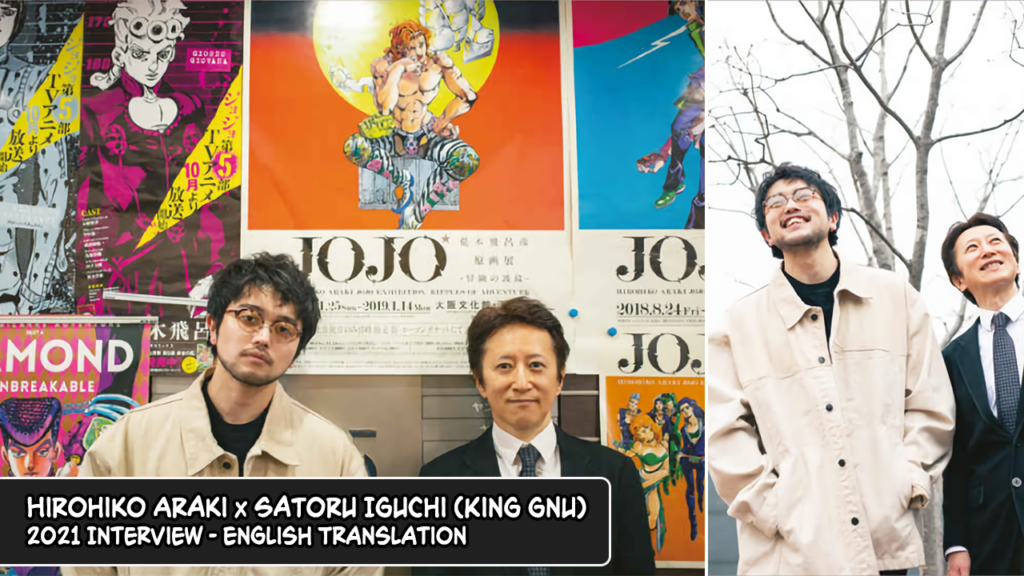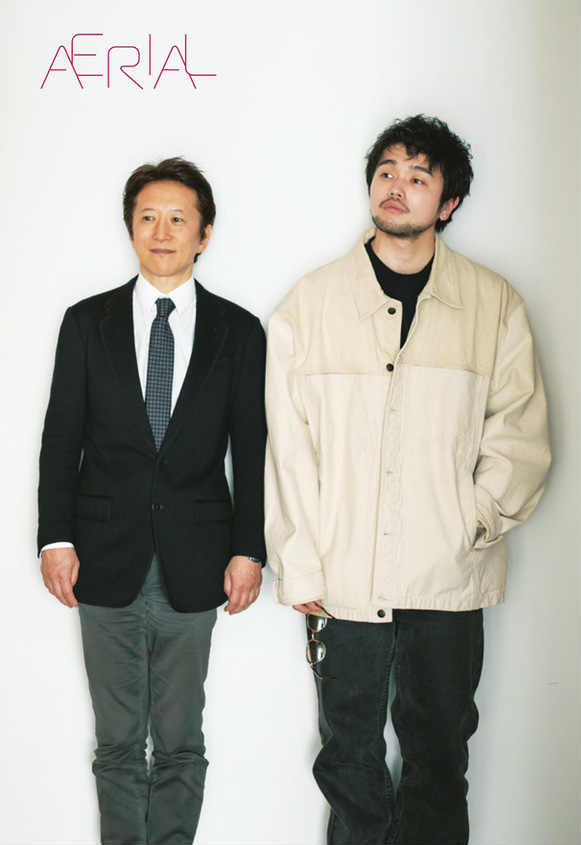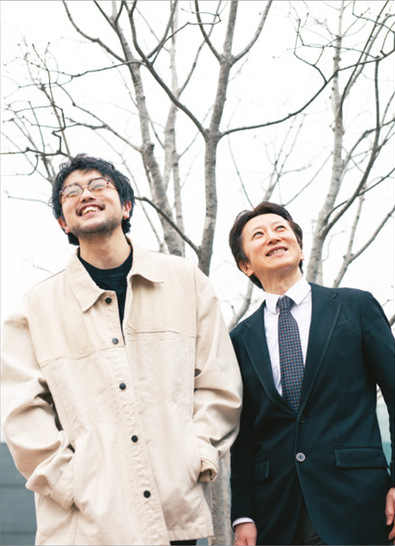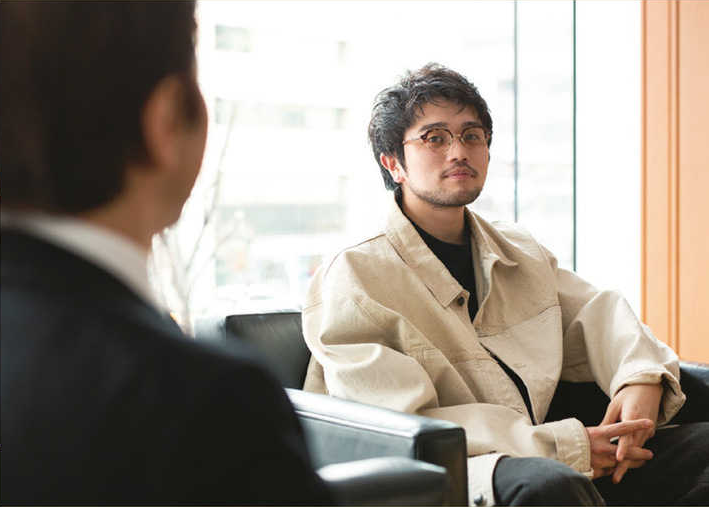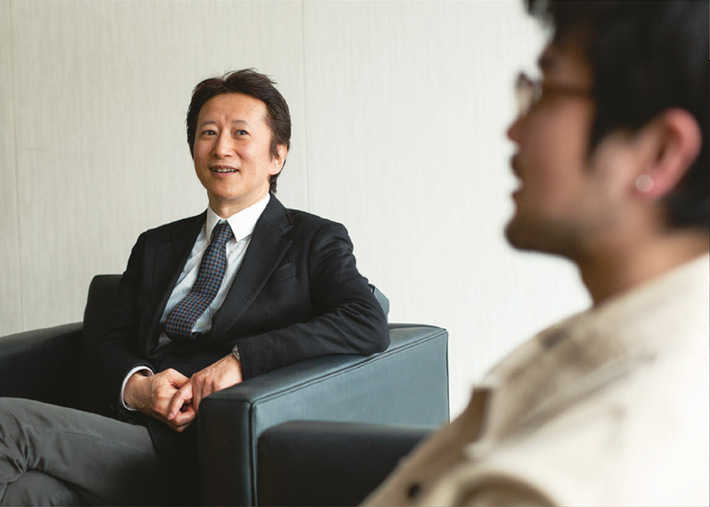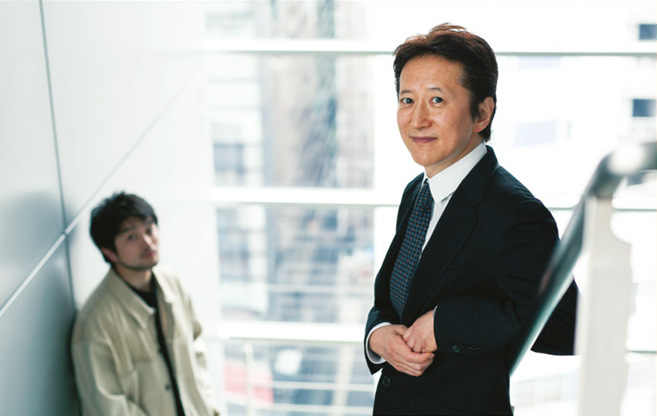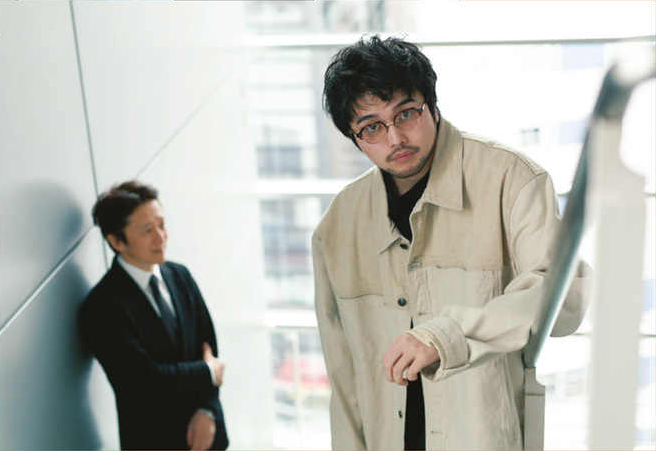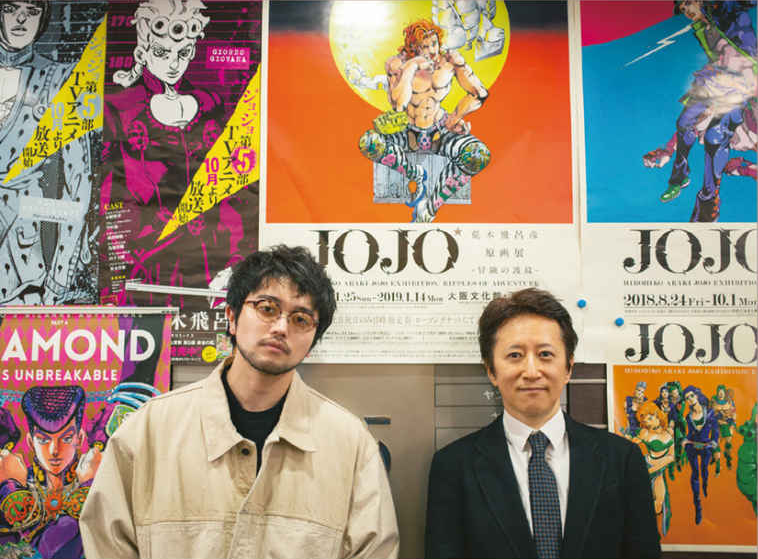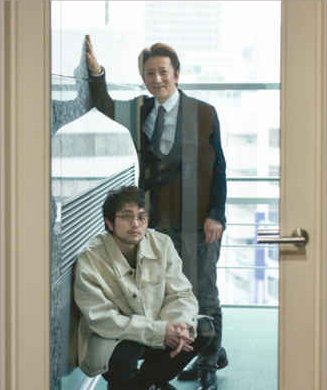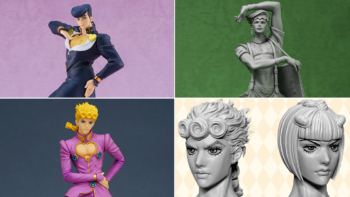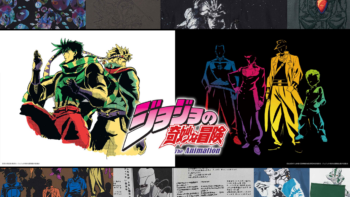Satoru Iguchi, the vocalist and keyboardist of the Japanese band King Gnu, interviewed the manga artist of JoJo’s Bizarre Adventure, Hirohiko Araki, for AERA magazine in early 2021.
Formerly known as Asahi Journal, Asahi Shimbun publishes AERA, which is a Japanese weekly magazine. They spread Iguchi’s interview with Araki across four issues. The issues released on April 5, April 12, April 19, and April 26, 2021. Since AERA lists their cover date a week ahead of the release date, the cover dates are “4/12”, “4/19”, “4/26”, and “5/3” respectively.
Interview
I was trying to bring out my Stand
Iguchi: Nice to meet you.
Araki: Nice to meet you too. I’m honored to have been invited.
Iguchi: Not at all! I didn’t even imagine you would accept.
Araki: Actually, I’m currently working on a manga called JoJolion (Part 8 of JoJo’s Bizarre Adventure), and I’m hooked on naming the characters’ abilities using the word “King”. That’s why when my editor told me that I had a request for a dialogue with King Gnu, I decided to accept it (laughs). When did you start reading?
Iguchi: The first manga I ever read was JoJo when I was in the second or third grade of elementary school. I’ve been reading it in real time since Part 6.
Araki: Part 6! It feels like that was just the other day (laughs).
Iguchi: I’m the youngest of four siblings, and all of the volumes of JoJo that my three older siblings collected with their pocket money were in our house. If I had been reading Dragon Ball, I think I would have been trying to shoot a “Kamehameha”, but in my case, I was trying to bring out my “Stand” (the visualization of a character’s superpowers in JoJo).
Araki: You were quite the unique kid, huh? (laughs)
Iguchi: JoJo has a clearly different atmosphere from other manga. Defeating enemies is only part of the process of the adventure, and it doesn’t really make them become stronger.
Araki: It’s a “bizarre adventure”. I’m not drawing it with characters feeling that they want to become stronger like Dragon Ball. People who are weaker and have a twisted personality often leave a stronger impression, don’t they?
Iguchi: Yes (laughs). In JoJo, the characters’ mental growth is depicted.
Araki: By overcoming their fears and worries, I depict their emotional growth. Having lived in the world of shonen manga, I’m ingrained with the idea of growth. It’s an old story, but I was really drilled hard by the editors.
Iguchi: Did you also have a tough time, Araki-sensei?
Araki: It was quite a scene back then. When I was waiting in line to have my manuscript read, the person before me would get heavily criticized just at a glance of their manuscript, and I’d be thinking, “I’m next…” (laughs). I’ve even been told, “You slacked off a bit on this drawing, didn’t you?” and had to redo everything.
Iguchi: Did you make it in time for the deadline?
Araki: I had no choice but to make it.
Iguchi: Wow. In JoJo, there’s a genius manga artist named Rohan Kishibe. I automatically assumed that maybe you were like him, Araki-sensei.
Araki: That was my wish, and there was a certain manga artist who served as the model for him. This manga artist has a number of legendary stories about him, like how he would go out drinking almost every night, yet he was able to finish both the story and the illustrations in no time. I was practically dying just trying to draw 20 pages, so I couldn’t possibly imitate him, but I think I might have been aiming for that.
Iguchi: So even you have such aspirations, Araki-sensei. Do manga artists often go out drinking together?
Araki: I wonder, probably not very often.
Iguchi: I don’t often either, really. The band members get along well, so we always feel like we’re together.
Araki: I like bands where the members get along well. When listening to their music, you can somehow tell.
Iguchi: That’s true. The atmosphere in a band is very delicate, and if even one person is a bit on edge, I think the groove could disappear.
Araki: Yes. I really hate stories about band members leaving!
Iguchi: It’s sad, isn’t it? (laughs)
The covers of Jump were amazing
Iguchi: In this series, we have a rule that I bring something based on the impression I have of my conversation partner and then present it to them.
Araki: Oh, I’m looking forward to it.
Iguchi: So, I was wandering around antique shops around Meguro, but nothing really struck me. As I was thinking about what to do, I remembered a Castella shop along the Meguro River that smelled good, so I bought some. I guess it’s just an ordinary gift though (laughs).
Araki: Thank you.
Iguchi: It’s just the impression I got, but I thought you might like sweets.
Araki: I love them.
Iguchi: Really?! I was wondering if bean daifuku would be good too. Sesame honey dumplings also appear in your works.
Araki: Hahaha. I also like wagashi (traditional Japanese sweets). I’m a big fan of Hato Sabure (pigeon-shaped shortbread cookies) too.
Iguchi: By the way, what kind of cuisine do you like?
Araki: I like Italian and eat it often. I also make it myself.
Iguchi: You cook!
Araki: Yes, I’ve improved my skills even more during this lockdown period (laughs).
Iguchi: So you make your own meals and then open a bottle of wine?
Araki: I do drink wine.
Iguchi: That’s very stylish.
Araki: There’s nothing else to do (laughs).
Iguchi: I’m 27 years old now, and I’ve just recently begun to appreciate the joy of full-course meals. When I get served wine that pairs with the food, and I’m talking with the person I’m with about things like “I wonder what’s in this soup?”, it feels like I’m doing something very grown-up, or it’s moving in a way. Full-course meals are fascinating, aren’t they?
Araki: Yes. They reflect the unique perspective and creativity of the chef, after all. It also provides inspiration for my manga drawing.
Iguchi: Also, I feel good wearing a suit.
Araki: That doesn’t seem like the impression King Gnu gives off (laughs).
Iguchi: I’m more formal off stage (laughs). It’s fun to go with the flow of the place. That’s pretty much what I discovered.
Araki: When I listen to King Gnu, I think your singing style is very unique.
Iguchi: I was thinking about my own style, or how I should sing, for the first two or three years after I joined this band. But I originally studied classical vocal music, and my roots are different from other people’s. Maybe that’s what’s showing through.
Araki: I like vocalists like you, where you can tell it’s them just from hearing one phrase. In painting, it would be a great work if you can tell who drew it from a distance of several meters. The same goes for manga, I think it’s better to have a drawing that you can tell is yours, even if it’s weird, than to be good at drawing something similar to someone else’s.
Iguchi: I see! Araki-sensei’s drawings are outstanding. They don’t look like anyone else’s. The destructive power of a single picture is extraordinary.
Araki: The covers of Shonen Jump in the 1980s and 90s were amazing. For example, the drawings by Tsukasa Hojo and Tetsuo Hara are of such a high grade that they still move me when I see them now. I didn’t want to lose to that.
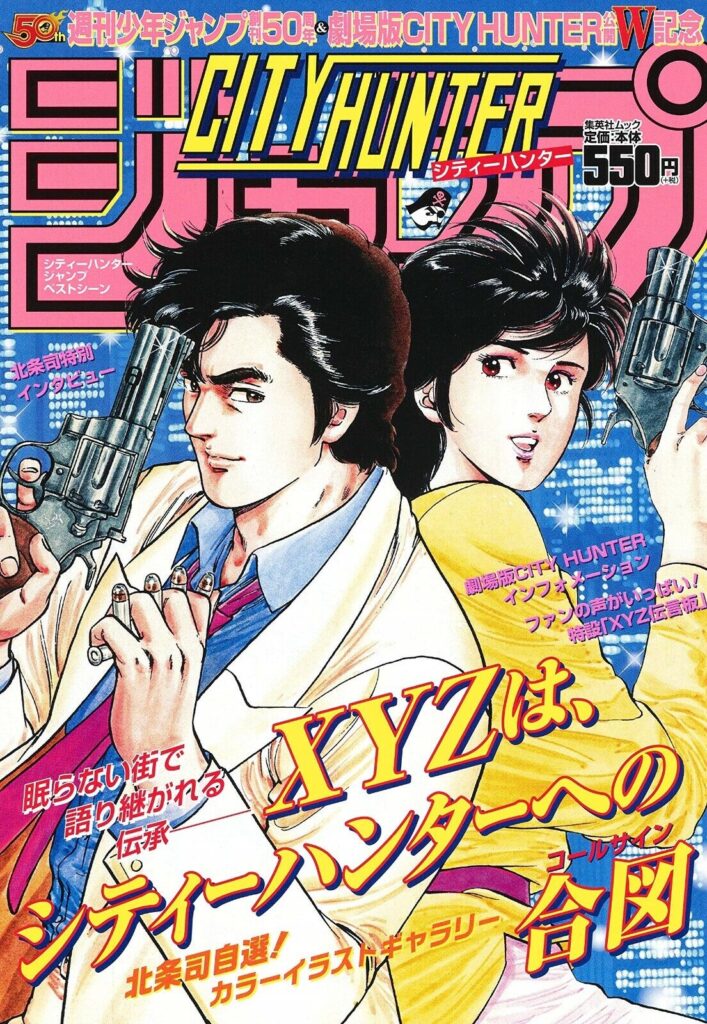

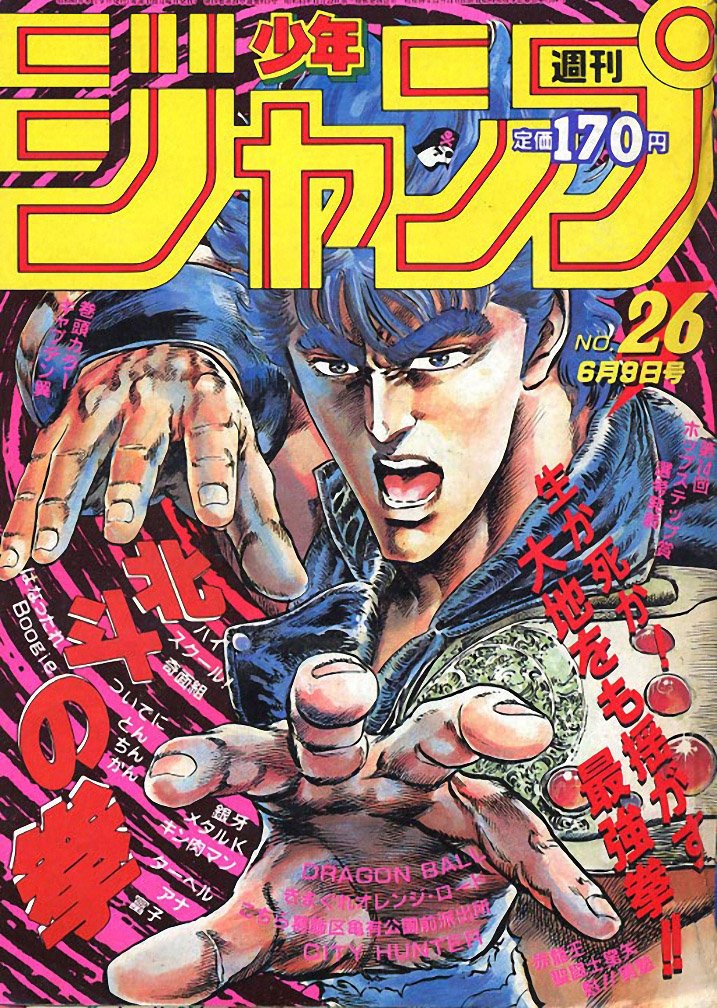

Iguchi: Manga artists pursue that alone, don’t they? Do you feel lonely?
Araki: Yes, that’s true. That’s why I’m envious of bands, and I want to feel that sort of world they’re in. King Gnu seems to be a very well-behaved group, but you’re all diligently and calculatedly creating your work, aren’t you?
Iguchi: Yes, that’s true (laughs).
Araki: Like, you’re aiming to put out this kind of mood. Or deciding to drive a classic car.
Iguchi: Exactly (laughs). I just bought one recently, a classic car from the ’70s.
Araki: I knew it! (laughs)
“Bizarre Adventure” is a convenient title
Iguchi: In JoJo, a visualization of supernatural powers called “Stands” appear. How did you come up with that idea?
Araki: I wanted to draw something invisible, something hidden. It’s a representation of the person’s hidden face, their true nature, so to speak.
Iguchi: I’m drawn to Stands that are weak, or rather, hard to use. For example, “Survivor” that appears in Part 6. It stimulates everyone’s fighting instinct, making them fight to the death.
Araki: Ah! (laughs)
Iguchi: I find abilities that require creativity to use interesting. The definition of strength in JoJo has changed quite a bit from the beginning to now.
Araki: That might be true. Initially, power and speed were the standards of strength, but as I drew many Stands, a different set of values emerged. I started to feel that it’s more bothersome to have someone who persistently attacks a single point.
Iguchi: The Stand of a character called “Damokan” in Part 8 can make humans extremely soft. And then, what he does is cut out people’s livers, or makes tropical fish swim inside their bodies. In other words, the ability to soften is simply a means, and Damokan just likes torture…
Araki: Hahaha (laughs).
Iguchi: Stands reveal the disgusting nature of people.
Araki: One of my favorites is a junior high school student named “Shigechi” who appears in Part 4. He uses his Stand “Harvest” to collect money that’s fallen around town, but the things he says gradually become more and more absurd. I really wanted to draw him a bit more, but unfortunately, he ended up dying.
Iguchi: When Shigechi died, everyone felt kind of frustrated. I didn’t even like him that much, but… Do you like characters who are scum but still somehow endearing?
Araki: I like them (laughs). I don’t want to depict a hero through my work, I just want to depict characters.
Iguchi: Does that mean you want to depict diversity?
Araki: No, it’s more simple than that. It’s about my own affections and my view of the world.
Iguchi: So, is the protagonist of Part 8, Josuke Higashikata, having a tooth gap also part of your unique tastes?
Araki: Yes. I thought it was stylish.
Iguchi: His tooth gap?
Araki: Yes (laughs). I think it looks friendly, and there’s a certain kind of unpolished charm to it that I find appealing.
Iguchi: I see. Things that are too perfect are boring.
Araki: After all, it’s a “bizarre adventure”. I think I chose a convenient title (laughs). It allows anything to be okay. But isn’t King Gnu also quite a bizarre band? I wonder what kind of people, with what kind of sensibilities, come together to form such a band.
Iguchi: Indeed, we do feel like we don’t really mesh with other bands, or rather, we both feel like we can’t become too friendly (laughs). I don’t think there are many bands where such diverse people gather. The guitarist is a cellist, the drummer is into funk, the bassist played jazz. I didn’t listen to much Western music, I was more into kayōkyoku (traditional Japanese pop music) and classical music.
Araki: That’s probably what leads to that chaotic musical style. I think other manga artists probably think that Hirohiko Araki is an enigmatic guy.
Iguchi: I can definitely see where they’re coming from (laughs).
The “Mona Lisa” is my goal
Iguchi: Araki-sensei, you have a great deal of respect for Clint Eastwood. You once had a conversation with him in a mook to commemorate JoJo‘s 25th anniversary. Were you nervous back then?
Araki: Of course I was. But he was very relaxed, and he was eating this huge cookie while we were talking. And then he left about half of it behind. I took it home as a souvenir.
Iguchi: Hahaha!
Araki: I’ve loved his movies since I saw them as a child. I think it’s wonderful that someone I admire continues to create with the same attitude.
Iguchi: That’s you to me, Araki-sensei. I think there must have been times when you felt frustrated or had a tough time during your long career. How did you overcome those times?
Araki: First of all, I never thought I would continue it for such a long time. I was just thinking about drawing what I had at the moment.
Iguchi: I see.
Araki: I suppose I never really thought to myself, “Wow, I’ve made it big.” Before I knew it, I had gotten a bit older, but I’ve never seen myself as a big shot. Yeah, I guess that’s the best way to put it. I wasn’t the type to drive around in a sports car, thinking, “I’m on a roll!”
Iguchi: I’m always afraid about what I’ll do if I lose popularity or if nobody listens to me anymore. People around me say, “You’ve made it,” but I’m still scared. You don’t have that fear anymore, do you, Araki-sensei?
Araki: No, I do. I’m always thinking that I might get canceled. Also, there’s a part of me that doesn’t want to acknowledge the talent of new manga artists. When I look at it calmly, I think they’re good, but at first I feel a bit uncomfortable.
Iguchi: It’s amazing that you still have that sensitivity.
Araki: I often watch the works of the seniors I respect, like Clint Eastwood, in chronological order and think about what they were doing when they were my age. It encourages me to see that they didn’t pander.
Iguchi: Not pandering is incredibly admirable, isn’t it?
Araki: It’s difficult. Of course, we have to make a profit.
Iguchi: If you don’t appease them, many people may start to drift away.
Araki: But, for example, the “Mona Lisa” is seen by tens of thousands of people every day. Even though the person who painted it and the person who was painted are dead, people go to see the painting. That’s my goal.
Iguchi: So, it’s about where you set your sights, isn’t it?
Araki: I guess that’s what art is. When I hear the secret story behind the creation of the Mona Lisa, it seems that he was painting it for a long time. He kept it at hand for over a decade.
Iguchi: There’s a song called “2992” on the new album by millennium parade, which is led by our guitarist, Daiki Tsuneta. Daiki was born in 1992, and he composed that song with the hope that it would be remembered a thousand years from now. It made me think that perhaps everything hinges on whether you set your sights that far ahead.
Araki: That’s a great spirit. It’s moving to perceive that through art and music. While it’s great to watch the flashy plays of athletes, I’m drawn to things like the Mona Lisa.
Iguchi: What will happen in JoJo in the future?
Araki: The Part 8 I’m currently drawing is entering its climax, and right now I’m focusing on dealing with that. I don’t think much about the future. The present moment is everything for me.
Iguchi: I’m looking forward to it. Please keep on creating, just like Eastwood.
[Translated by Vish]See also: Araki’s meeting with Clint Eastwood
About King Gnu
King Gnu is a Japanese band that formed in 2013, consisting of Daiki Tsuneta (Vocalist & Guitarist), Satoru Iguchi (Vocalist & Keyboardist), Kazuki Arai (Bassist) and Yu Seki (Drummer). Their original name was Mrs.Vinci, later going by Srv.Vinci, and finally King Gnu in 2017.
King Gnu performed the first opening of Ousama Ranking (Ranking of Kings), the first ending of Banana Fish, and the opening and ending themes for the Jujutsu Kaisen 0 film.

